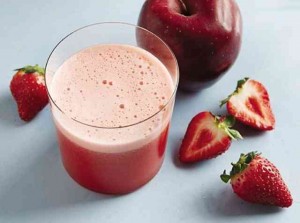The Christmas diet that celebrates life and doesn’t break the heart

JUICING is a trend that started a few years back, with a promise of good health and well-being.
FILE PHOTO
There’s still five days left before the real reason for the season arrives. But it’s a certainty that the celebrations, parties and all-night revelries have been coming along left and right.
Along with such gatherings are the food and drinking binges—the consumption of cholesterol-rich meat dishes and other foods derived from animal products (pork, beef, chicken, eggs, cheese, milk), combined with excessive amounts of alcoholic beverages. Sometimes, the partying gets over the top, and we wonder if we’re celebrating the birth of a Savior, or anticipating a one-way trip to the hospital with the Grim Reaper.
Inquirer Science/Health makes a yearly reminder to readers to tread very carefully around the many “diet traps” of the Yuletide season. There is a reason health experts call this time of the year the “Merry Christmas Coronary” or the “Happy New Year Heart Attack.”
Cholesterol
In one of the 2012 special issues of Inquirer’s Talk of the Town titled “Holiday feast sans ill side effects,” it was explained that cholesterol could be found in all foods that come from animals: meat (pork and beef), poultry, fish, eggs, milk, cheese, yoghurt and the like. Choosing lean cuts of meat supposedly to avoid cholesterol is a myth; much of the cholesterol is, in fact, in the lean portion.
Filipino nutritionist-dietician Blecenda Miranda Varona says cholesterol is a nonessential component of our diets. When we consume the “internal organs of animals (in the form of dishes) like sisig, bulalo and bopis, which contain thousands of milligrams of cholesterol,” we also absorb those unwanted amounts of cholesterol into our systems, says Varona.
The US-based Physicians Committee for Responsible Medicine, which promotes preventive medicine, says “every four-ounce serving of beef or chicken contains 100 milligrams of cholesterol. Also, most shellfish are high in cholesterol. All animal products should be avoided for this reason. By contrast, no foods from plants contain cholesterol.”
Animal products also contain saturated fat which causes the liver to produce more low-density lipoproteins (LDLs—the bad cholesterol). Beef, chicken and most other animal products contain substantial amounts of saturated fat. A few vegetable oils are also high in saturated fats.
Therefore, the greatest gift one can give to loved ones this Christmas is the gift of health—a way to literally survive a historically toxic season (and even emerge from it healthier). That kind of gift is prepared and wrapped right in our very own kitchens, and with the power of information technology right at the palm of our hands, finding food preparations that avoid animal products is as easy as the click of a mouse.
Delicious examples
Here are some delicious examples:
Portobello mushrooms and beans, raw vegetables, dairy-free creamy butternut squash soup with mushrooms, black bean lettuce bundles, tropical fruit salad, spaghetti squash primavera, spinach with mushrooms, easy vegetable pizza, grapes or other fresh fruits, chocolate dip with fresh fruit and berries, coconut carrot cream pie, and shiitake watercress soup are just some of the food dishes discussed (with recipes) in the book “Super Immunity” by Joel Fuhrman, MD. The book shares essential nutrition guides for boosting your body’s defenses to live longer, stronger and disease-free.
Recipes for Dr. Fuhrman’s Easy Vegetable Pizza (which serves four) includes: four large whole grain pitas, two cups no-salt added or low-sodium pasta sauce, one-half cup chopped shiitake mushrooms, one-half cup chopped red onion, 10 ounces frozen broccoli florets, thawed and finely chopped and one-half cup shredded vegan mozzarella-type cheese alternative (Note: health food stores in the country offer nondairy cheese substitutes).
Preheat the oven to 200 degrees Fahrenheit. Place pitas on two baking sheets and warm for 10 minutes. Remove from oven and spoon on the pasta sauce. Sprinkle evenly with the mushrooms, onion and broccoli. Add a light sprinkle of “cheese” (nondairy cheese substitute). Bake for 30 minutes. Serve and enjoy.
Vegetarian dishes
Vegan lifestyle advocate Nona Andaya Castillo suggests the vegetarian version of kaldereta: A mix of tomato sauce, coconut milk and fried or baked tofu.
Castillo also suggests tofu stroganoff, which consists of tofu, shiitake mushroom (dried or fresh) and dairy-free cream sauce—cashew nut with blended tofu.
One can also make meatless embutido made from mushrooms, whole-wheat vege meat, vegesmoked sausage, vegetables and whole-wheat vegan carrot cake with dairy-free butter sauce. You can find the mock meats at vegetarian stores like Daily Veggies (Sto. Domingo Street, Quezon City), Oscar Anne’s (Leveriza Street, near Adventist Hospital in Pasay City), Daily Care Food Mart (a vegetarian store) at 1963 San Marcelino Street corner Quirino Avenue, Manila.
An online site has been helpful in directing vegetarians and open-minded omnivores to restaurants nearest their locales. The site, www.happycow.net, lists down the addresses and contact numbers of nearly all vegetarian and vegetarian-friendly restaurants and food stores, and includes short descriptions of the establishments. Just type in your location anywhere in the world.
Ninety percent of Filipino adults have at least one risk factor for arteriosclerosis (the thickening of the walls of the artery as a result of the accumulation of fatty materials, which can lead to heart disease, organ failure, stroke and a host of other so-called lifestyle diseases), says the National Nutrition and Health Survey, an interagency study participated in by the Food and Nutrition Research Institute. That’s just one too many. In a season that takes the Pinoy’s notion of celebrations to the extreme, that one factor may spell the difference between a tragic and a joyous Christmas.
